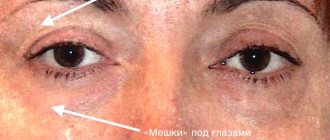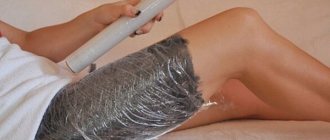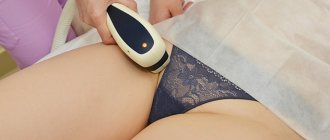From this article you will learn:
- What is lipolytic therapy
- For which areas of the body is lipolytic therapy effective?
- What are the contraindications to lipolytic therapy?
- What drugs are used for lipolytic therapy
- How is lipolytic therapy performed?
- What are the possible side effects?
- How to maintain the effect of lipolytic therapy for a long time
We all dream of a neat silhouette with a clear outline and no excess. However, these same excesses sometimes spoil the entire appearance. Weight loss is a long-term process, as is reducing body volume in problem areas. Lipolytic therapy is an injection method for body modeling. No, it will not lead to weight loss, but it will be an excellent assistant in eliminating small fat deposits.
Description of the complex
To urgently “exterminate” unwanted fat deposits on their own beautiful body, people striving for perfection use the most advanced and effective means. One of the “lifesavers” of modern cosmetology and dietetics is the method of mesotherapy. Specially developed drugs are designed to affect different parts of the body with the required intensity. They are injected using a thin, short needle into the middle layers of the skin or subcutaneous fat.
The common name for the procedure is chemical liposuction. The reduction in the volume of fat in the treated area occurs without the risk to life, which to some extent involves the use of anesthesia during the surgical (classical) method of “pumping out” annoying deposits.
Lipolitics: what are they?
The term “problem area” is well known to many.
This is an area of the body with local excess fat deposits. For most women, the hips are problematic, especially their outer surface (“breeches”), the lower quadrants of the buttocks, the lower abdomen, and the lower back. In men, excess subcutaneous fat is most often located in the lower abdomen and back. Previously, it was believed that it was almost impossible to deal with problem areas. Due to the peculiarities of the regulation of lipid metabolism, the fat layer here is particularly resistant to the effects of diets and physical activity. To remove fat deposits in places where they accumulate locally, you must first lose weight, and then complete the process, which today is commonly called the fashionable word “drying”, a grueling daily training regimen in combination with a very strict restrictive diet.
The situation changed with the advent of lipolytics. These drugs allow you to solve the problem faster and more effectively: without diets and cardio, without liposuction and a difficult recovery period. Their unique feature is their ability to destroy adipose tissue locally, exactly where it is most pronounced. For a pronounced and lasting effect, it is enough to undergo a course of lipolytic therapy, which involves the injection of special substances directly into the subcutaneous tissue.
The history of successful application of the technique goes back more than 30 years. Initially, it was used to eliminate fatty plaques on the skin of the eyelids, consisting mainly of cholesterol. The excellent aesthetic effect served as an impetus for further study of the method’s capabilities and led to the creation of formulations that make it possible to combat local fat on any part of the body, from the double chin to the thighs, abdomen or back of the hands.
Mechanism of action . The lipolytic has a targeted effect on fat cells. Special components of the drug destroy the cell membrane and promote the breakdown of triglycerides, which make up adipocytes. Other active substances envelop the fat, transform it into an emulsion and facilitate elimination naturally - through lymph and blood.
The key feature of the method is the complete absence of incisions on the skin and minimal tissue damage. This distinguishes lipolytic therapy (the technique is often called intralipotherapy, injection liposuction or lipolytic mesotherapy) from surgical liposuction. There is no injury to tissues or blood vessels. The recovery period after the session is easy and with minimal discomfort. The aesthetic result is comparable to the effect of a full-fledged surgical intervention.
However, it should be noted that it is incorrect to call lipolytic injections mesotherapy (although this often happens). The goal of mesotherapy is to rejuvenate the cell pool and intercellular matrix of the dermis to increase its tone and elasticity. Intralipotherapy has a fundamentally different goal - the destruction of fat deposits where there is an excess of them.
The second difference is the depth of drug administration. Mesotherapy cocktails are injected into the dermis to a depth of 5 mm to 10 mm. In injection lipolysis, the active ingredients are injected directly into the subcutaneous tissue, usually to a depth of 10 mm to 15 mm.
Mrx lipolytic complex composition
The active substances of the drug are carefully selected taking into account their mutual influence on each other and the totality of their effects on the human body. Each ampoule contains the following substances:
- Levocarnitine. Is an active participant in the processes of energy and substance metabolism. It is not always produced in sufficient quantities in the human body. Disturbances in the synthesis of this type of elements are systemic in nature. Finding the true cause of the lack of levocarnitine in tissues takes valuable time. The introduction of an additional “portion” of the component serves as a “trigger” for the start of active activity of the striated muscles to burn fat cells. Carnitine stimulates the processing of this connective tissue with the release of energy necessary for the normal functioning of the human body. Good results are obtained by introducing levocarnitine into the fat layer or subcutaneous space of the “problem” area in people who control body weight.
It has a positive effect on the condition of the skin, activating the restoration processes in its cells and strengthening the membranes.
- Sodium deoxycholate. A natural enzyme produced in the liver of animals. Under its influence, the permeability of cell membranes increases. When sodium deoxycholate comes into contact with lipids, it neutralizes them. Molecules of water and fats combine and turn into a special neutral mixture (emulsion). The drug "Mph lipolytic complex" relieves a person of local fat deposits by destroying the lipid cells themselves, and not by depleting them (which happens during a diet).
- Dandelion extract. An extract from the roots of dandelion, which has a powerful diuretic property. Stimulating the outflow of fluid helps problem areas quickly get rid of broken down lipid cells. Increasing the intensity of the liver and kidneys helps cleanse the internal environment of fat breakdown products, which appear in abundance after each procedure of MPH lipolytic injections.
Read also: Effect of fat burner Lotus on the body
Be sure to read: Which drug is better - Eutirox or L-Thyroxine?
What are the benefits of lipolytic therapy?
Compared to other known methods of getting rid of excess adipose tissue, lipolytic therapy has a number of advantages:
- effectiveness in the treatment of delicate areas of the body - face, neck, intimate area;
- complete removal of not only fat, but also fat cells directly, which eliminates the possibility of relapse;
- short rehabilitation period and low risk of complications;
- absence of scars, scars, stretch marks after the procedure;
- excellent patient tolerance;
- As a conservative method of treatment, lipolytic therapy is absolutely devoid of the main disadvantages of surgical intervention - liposuction;
- allows you to cope with fat deposits from 1 mm to 6 cm in diameter.
Areas of use
Men and women who have problems with loose deposits of subcutaneous fat decisively get rid of their external flaws using “chemical liposuction” in the following critical areas:
- Stomach. A vast territory with the most visible “strategic reserves”. It is preferable to puncture the main areas of accumulation of subcutaneous fat in the abdomen - the lower part, the side surfaces.
- "Ears". An unpleasant visual effect is caused by accumulations of fat on the sides of the thighs, forming lumps. When walking, such “breeches” are especially striking, making the figure angular and swollen. This type of deposits occurs not only in obese people. This unpleasant feature is the fruit of a genetic predisposition. Even slender people can have soft “ears” that stick out on the sides. With physical exercise, such a flaw in appearance can be removed with great difficulty, especially in women.
- Hips. It is not common in men. The presence of “legs” is a common female distinctive feature. In the hip area, nature has planned to store reserves of nutrients (in the form of fat, cellulite) in case of pregnancy during a lean year. This is a difficult area for effective weight loss, since “melting” fat in it will happen last. A full course of injections with Skinasil Lipolytic can significantly reduce the number of extra centimeters that will not appear later, even in the absence of strict dietary restrictions.
- Sides. The result of waist shaping in this particular area of the body is clearly visible.
- Double chin. The use of a lipolytic course helps to reduce the double chin and tighten sagging skin. The combined use of massage gives a rejuvenating effect and forms a clear oval of the face.
For which areas of the body is lipolytic therapy effective?
Many methods of combating fat deposits cannot be used to work in delicate areas - on the face, neck, hands. The reason for this is the high level of trauma and the likelihood of unpleasant consequences (severe swelling, bruising). Lipolytic therapy will relieve you of negative residual effects and allow you to become more beautiful. As a result of many experiments, those areas of the body were identified, when working with which this type of correction brings the most positive results:
- chin;
- cheeks;
- eyelids;
- neck area;
- shoulders;
- fat deposits in the joints and hands;
- outer and inner thighs;
- stomach and buttocks.
Lipolytic therapy: contraindications
There are no specific contraindications for this type of correction. Lipolytic therapy has almost the same contraindications as any other injection-type cosmetic procedure.
The general list includes individual intolerance to the drug or any of its components, as well as:
- infectious diseases;
- inflammatory processes in the body;
- exacerbation of chronic diseases;
- increased body temperature;
- wounds, abrasions and other skin damage at the sites of planned injections;
- dermatological and autoimmune diseases;
- the presence of any neoplasms;
- kidney and liver diseases;
- diabetes;
- diseases of the endocrine system;
- cholelithiasis;
- bleeding disorders;
- phlebeurysm;
- mental illness, epilepsy;
- pregnancy and breastfeeding;
- tendency to form keloid scars;
- age up to 18 years.
If you are prescribed anticoagulants, you must stop taking them two weeks before starting lipolytic therapy.
Read material on the topic: How to increase skin elasticity
How to inject MPH lipolytic complex
The cosmetic product can be purchased in specialized salons. But it is not recommended to prescribe it yourself. At least the first course of procedures must be carried out after examination by a doctor and consultation with a cosmetologist. If used incorrectly, there is a risk of body poisoning, acute allergic reaction, severe inflammation, and tissue necrosis.
Read also: Acetyl-L-carnitine, what is it and what can it be used for?
Be sure to read: Types of Chinese diet pills
After the necessary examination and questioning, the specialist conducts a course of “chemical liposuction”:
- In the area of the neck, décolleté, face, and chin, punctures are made to a depth of 6–8 millimeters. The skin there is very thin, sensitive, and subject to constant adverse environmental influences.
- In the areas of the hips, abdomen, and sides, the depth of the punctures increases.
The specific depth of insertion of the needle with the drug is determined by the doctor after measuring the thickness of the fat layer in each individual “problem” area of the body. Precision is important. If a lipolytic is introduced into muscle tissue or skin, this can provoke cell death in this area, since the active complex makes no difference which cells it destroys - fat or any other.
The course begins after the recommended period of abstinence from drug intervention in the body has passed (if treatment courses were carried out before) in order to avoid the development of allergies.
The period that the skin needs to rest between procedures is 7 – 10 days.
After each injection, it is advisable not to leave the body to chance, but to carry out intense massages of the treated areas. The best massage is vacuum (“cans”). The procedure is painful, but gives significant results.
Does lipolytic therapy have side effects?
Lipolitics can be classified as safe drugs that rarely cause complications. Still, there is a possibility of unwanted side effects. What could cause them?
- Individual reactions of the body
, which resemble allergy symptoms and manifest themselves in the form of redness, prolonged persistent swelling, inflammation, burning, itching. If such reactions occur, you should immediately contact the doctor who performed the lipolytic therapy procedure.
- Violation of hygiene standards, as well as cosmetologist errors when selecting a drug
, its dosage, injection technology. Such cases, unfortunately, are not uncommon if clients turn to inexperienced cosmetologists or those who carry out the procedure at home. Performing lipolytic therapy in a salon that has not passed the certification procedure can also bring undesirable consequences in the form of seals at injection sites, fibrosis of muscle tissue (if the needle enters the muscle instead of the fat layer), inflammation and subcutaneous hemorrhages. To get the expected effect and avoid complications, contact the services of competent cosmetologists in a trusted beauty salon.
Effect after the procedure
After administering the drug to the desired area, a burning and itching sensation occurs. The sensations are quite unpleasant and painful. They are removed with anti-inflammatory drugs, the use of which during the period of action of the lipolytic is undesirable, as this will reduce the effectiveness of the procedure. The usual duration of inflammation is 4 days. To alleviate the condition, you should self-massage the treated areas for as long as possible and as often as possible.
To alleviate the suffering of patients, it can be noted that severe itching and burning indicate a strong effect on the tissue and the high effectiveness of the injection.
Not very pleasant consequences
I would like to insure myself against the negative manifestations of this intervention, but there is a risk of observing the following side effects:
- Lumps under the skin. Damaged cells accumulate due to the lack of physical impact on the area, and the fat layer “melts” unevenly. Constant massage is necessary to avoid such situations.
- Bruises and spider veins. With the fragility of blood vessels, aggravated by chemical intervention, the appearance of hematomas is natural. You need patience and a careful attitude towards your body. The symptom is not aesthetic, but it does not indicate serious disorders.
- Allergic reaction. Diagnosed when symptoms of inflammation continue for more than 2 weeks. The condition is treated in the same clinic free of charge (the client only pays for the usual anti-inflammatory drug).
Read also: Healthy dandelion recipes for effective weight loss
Be sure to read: Medicine Metformin and its instructions for use
Cosmetologists' opinion
"Mrx lipolytic complex" is certainly effective. Its effect is noticeable after the third procedure.
Some clients require fewer injections, others more. It all depends on the initial volume of subcutaneous fat, the general condition of the person, and lifestyle.
Physical discomfort is natural. But it quickly becomes familiar.
Contraindications
Under no circumstances should this chemical be used during pregnancy or breastfeeding. The lipolytic has a local effect, but its effect on small life is unknown.
Diseases of the liver, kidneys. These organs are engaged in the final processing and removal of broken down lipid elements. Failures in their work are fraught with “slagging” of the body with lipid breakdown products.
Have ever had allergic reactions to medications. The occurrence of an acute reaction of the body to a lipolytic cannot be 100% predicted, but its probability must be reduced as much as possible.
The body's defenses, weakened by acute or chronic diseases, may not be able to cope with the entry of the active substance into the body, provoking a severe allergic reaction.









